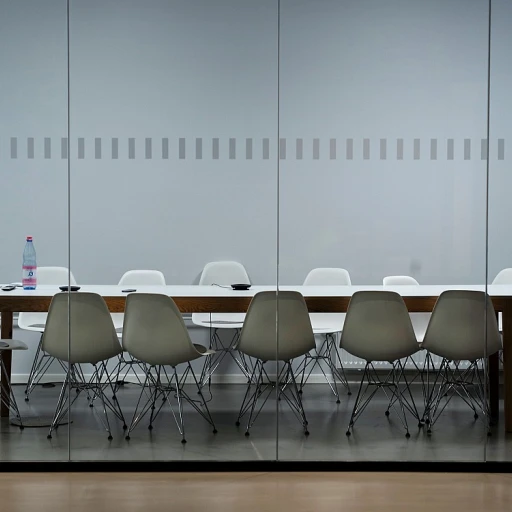Understanding Feng Shui Principles
Grasping the Core Concepts Behind Feng Shui
Feng Shui is an ancient Chinese practice focused on harmonizing individuals with their surroundings. It involves the arrangement and orientation of elements within a space to enhance the flow of chi, or energy, throughout a room. In an office setting, applying Feng Shui principles can significantly improve productivity and well-being as it introduces balance and positivity within the workspace.
Successful office layouts integrate these principles with an emphasis on enhancing the energy flow, particularly near a window, which serves as a pivotal energy source. Placing the desk in what is known as the "command position"—preferably facing the window—ensures the occupant feels empowered, especially when complemented by a strong, solid wall behind them. This strategic position also allows one to view the entrance without being directly in line with the door, facilitating a controlled flow of energy.
The flow of energy, or "chi," within your office affects the atmosphere and can influence productivity levels. Thoughtful desk placement, alongside other shui elements, enables a seamless integration of personal and work life. Implementing these Feng Shui principles in a corporate environment requires mindful consideration of the placement of walls, the selection of specific decor, and how natural light interacts within the space.
With office shui designs gaining popularity, many find that introducing these principles creates a more inviting and productive atmosphere. Understanding the core concepts behind these arrangements is key to harnessing positive energy and creating a more balanced office layout. Learn more about these practices and how they can impact your workspace in this insightful article.
Importance of Natural Light in the Office
Harnessing Natural Light for a Productive Workspace
Incorporating natural light is a pivotal aspect of designing an effective office feng shui layout. The strategic use of sunlight can work wonders by boosting mood, improving concentration, and energizing the workspace. Sufficient access to natural light is not just beneficial for the overall energy flow; it directly impacts your physical and psychological well-being. An office layout that's bathed in natural light can invigorate the chi energy and create an inviting atmosphere. Place your desk in a way that allows you to benefit from natural light while avoiding direct glare. Facing a window can exponentially heighten your workspace's positive energy and minimize shadows that can disrupt the work flow. It's crucial, however, to leave enough space between the desk and the window wall to ensure proper ventilation and comfort. Balancing natural light with the elements of your office layout is vital. Curtains, blinds, or reflective surfaces can help manage the light intensity, ensuring harmony and comfort in your workspace. Understanding the connection between light and productivity can shift the energy flow and cultivate an environment supportive of your work objectives. To delve deeper into how natural light can be harmonized with other feng shui elements, explore these tips for enhancing meeting room harmony with feng shui.Optimizing Desk Placement for Success
Strategically Positioning the Desk in the Office
In the pursuit of effective office feng shui, the placement of the desk is paramount. A well-situated desk can significantly influence your energy flow and productivity within your workspace. One crucial element in the shui office is the command position, where the desk is positioned to face the entrance, yet not directly in line with the door. This orientation fosters a sense of control and security, enhancing the flow of positive energy.
Ideally, avoid placing the desk against a wall, as it can block chi energy. Instead, ensure there is a solid wall behind you, symbolizing support. By doing so, you create an inviting workspace that embraces new opportunities, rather than feeling confined.
Positioning your desk to harness natural light is another valuable strategy. If possible, place the desk near a window, as exposure to natural light can improve mood and increase alertness, key components for a conducive office environment. Just remember that the direct glare from the sun might cause discomfort, so consider light-filtering options.
For optimal energy, consider the overall office layout and ensure a balanced distribution of the five feng shui elements—wood, fire, earth, metal, and water. These elements can subtly influence your surroundings, so incorporating them thoughtfully in the room can further promote a harmonious and effective shui layout.
To delve deeper into integrating these principles into your workspace, you can explore approaches to understanding different approaches to power in office settings. This resource provides valuable insights that can complement your efforts in designing a productive and positive office layout feng.
Balancing Elements for Harmony
Harmonizing Your Workspace Layout
Balancing elements in your space is crucial to creating a harmonious work environment. Traditional feng shui emphasizes the use of the five elements—wood, fire, earth, metal, and water—to maintain energetic balance. Each element brings unique qualities to the room and can influence the energy flow or chi energy within your office layout. When planning your workspace, consider the following suggestions to foster harmony:- Position Your Desk with Intent: Place your desk in a command position, where you have a clear view of the door without being directly in line with it. This encourages a sense of control and stability within your workspace.
- Incorporate Natural Elements: Introduce natural materials and colors that represent the elements, such as a wooden desk for growth or a metal lamp for clarity and precision. This can enhance the positive energy in your workspace.
- Balance Solid and Fluid Elements: If your office is heavy on solid structures like walls and furniture, incorporate more fluid elements like a water fountain or plants to promote flow and balance.
- Optimize Lighting: Ensure that natural light enters your office space through a window, filling the room with positive energy and promoting productivity. Curtains or blinds can help regulate this flow as needed.













